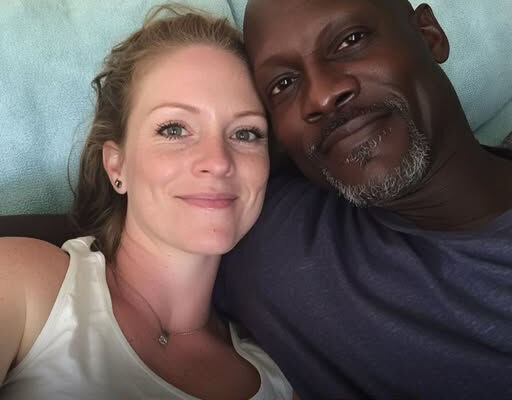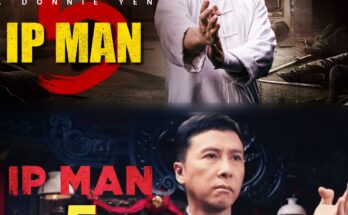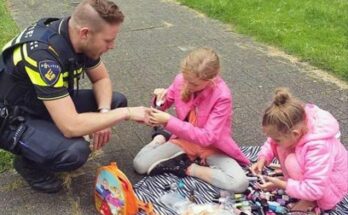At first, I was like, “Okay, I’m just being paranoid. He’s just a good son.” But then he started showing up with new clothes, and this man HATES shopping!
The final straw? I found a receipt in the trash—from a jewelry store. And let me tell you, I definitely didn’t get any jewelry! My gut was screaming: HE’S CHEATING! So, the next time he said he was “visiting his parents,” I got in my car and followed him. And sure enough—he didn’t go there! And it still wasn’t the worst part—suddenly, I saw WHERE he stopped and, more importantly, WITH WHOM.
He pulled up to a cozy red-brick bungalow on the far side of town, a neighborhood neither of us ever mentioned. Parked in the driveway was a silver sedan with a purple cancer-awareness ribbon on the license-plate frame. Before I could blink, the front door swung open and a woman—mid-thirties, pixie cut, bright scarf knotted at her neck—stepped out. She hugged Steven like she’d known him forever.
My heart swan-dived into my stomach. Hugging? Really? I reached for my phone to snap a picture, but my hands were shaking so badly the camera app kept closing. I watched them disappear inside, then sat there gripping the steering wheel until my knuckles turned white.
That night I unloaded everything on my best friend, Rosa. We sprawled on my couch—me ranting, Rosa spooning sympathy ice cream straight from the tub.
“Maybe it’s not what you think,” she offered.
“Receipts don’t lie.” I waved the crumpled slip like a smoking gun. “Gold necklace. Five hundred bucks.”
Rosa chewed her spoon thoughtfully. “Necklaces aren’t usually cheating gifts. They’re ‘birthday-gift-for-Mom’ territory.”
“Or ‘thanks-for-the-secret-affair’ territory.”
She side-eyed me. “Then why the weekly trips? Every Saturday, clockwork. People having steamy affairs aren’t exactly…organized.”
I wanted to believe her, but the image of that hug replayed in my head like a broken GIF.
The next Saturday I followed him again, this time staying one car farther back. Same house. Same woman. New twist: an older man in a wheelchair was waiting by the walkway, blanket tucked around his legs. Steven greeted him, too, gentle as anything, then helped maneuver the wheelchair into a van with a medical-transport logo.
What was going on? Hospice visits? A secret second family? My imagination sprinted ahead, hopped fences, scaled walls. By the time I drove home, I’d convinced myself Steven had an entire alternate life, complete with mortgage and aging in-laws.
I didn’t sleep. I Googled the bungalow’s address, but nothing juicy came up—just a plain listing from ten years ago. No names I recognized.
The following Wednesday I cracked. Steven was stirring chili on the stove, humming off-key. I slapped the jewelry receipt on the counter like a detective in a TV drama.
He blinked. “You were…going through the trash?”
“Don’t you dare flip this on me! Who’s the woman in the brick house? Don’t tell me it’s your cousin—”
He set the spoon down, wiped his hands, and studied me. Not angry. Not defensive. More…hurt.
“Okay,” he said quietly. “I guess I should’ve told you sooner. Put your shoes on. We’re going for a drive.”
Twenty minutes later we pulled up—again—to the bungalow. Fear knotted in my throat. The scarf-wearing woman opened the door, saw me clinging to Steven’s arm, and broke into a soft smile.
“Claire, right? I’m Camila.” Her voice was warm but raspy, the vowels stretched by fatigue. Up close, I noticed the faint shadow where eyebrows used to be and the chemo port peeking above her collar.
Inside, the living room smelled like lemons and clean laundry. Framed photos cluttered the mantel: Camila with a little boy, Camila in graduation robes, Camila bald but grinning next to Steven at a fun run.
The older man from before was her father, Arturo. ALS had clipped his speech, but his eyes twinkled when Steven wheeled him over.
I perched on the edge of the sofa, equal parts embarrassed and confused. Steven knelt beside me.
“Camila’s my cousin,” he began. “Six months ago her lymphoma came back. Hard. She can’t work right now, and her dad needs constant care. I’ve been helping out—paperwork, errands, hospital runs.” He gestured at Camila’s scarf. “The new clothes you noticed? I bought them because court appearances require actual suits, apparently.”
Camila laughed—a quick, musical burst. “He’s my hero and my chauffeur. But he’s also ridiculously private.” She nudged him. “You didn’t want to ‘worry’ Claire.”
I sat there, cheeks on fire. “Why didn’t you just tell me?”
Steven ran a hand through his hair. “Because every time I tried, the words felt small. ‘My cousin’s sick’ doesn’t cover feeding tubes and insurance appeals and crying in hospital parking lots.”
Camila reached for my hand. “He was waiting for the right moment. There never is one.”
Tears stung my eyes—shame, relief, all tangled together. I squeezed her fingers. “I wish you’d let me help.”
“Well,” Camila said, smile tilting, “funny you should mention that.” She rummaged in a drawer and produced a delicate gold necklace—the one from the receipt. A tiny locket dangled at the center. “Open it.”
Inside were two miniature photos: Camila with her son Mateo, and Arturo in his wheelchair. On the opposite side, a blank oval waited.
“I asked Steven to save a spot for you,” Camila said. “If you’re willing.”
My breath hitched.
Steven cleared his throat. “Camila wanted someone Mateo could count on if—when—she beats this but needs a longer recovery. I was going to ask you to be part of our emergency-contact ‘team.’ And…” He pulled a smaller velvet box from his pocket. My world froze. “I wanted to ask something else, too.”
He flipped the lid. Not a ring, but a slim band of braided gold—more promise than proposal. “I know life’s chaos right now. I’m not asking you to plan a wedding tomorrow. Just…stand with me while we figure things out. Then, when the dust settles, I’ll get down on one knee properly.”
My throat closed around a yes so loud it only came out as a whisper. Camila clapped; Arturo managed a raspy cheer.
The next few months blurred into hospital visits, fundraiser bake sales, and late-night strategy sessions around Camila’s kitchen table. Rosa joined the cause, organizing an online auction for Mateo’s school tuition. Community poured in. Some days were brutal—chemo side effects, insurance denials—but there were small victories: blood counts rising, Arturo getting a state-of-the-art speech device, Camila regaining her appetite enough to demolish Rosa’s flan.
Through it all, Steven and I grew closer than any bouquet-and-dinner date could’ve managed. We learned to trade suspicion for questions, fear for honest conversation.
Six months later, Camila rang the ceremonial “end of treatment” bell in the oncology ward. Mateo tried to swing on it like a monkey; everyone laughed. Steven finally knelt—actual diamond ring this time—just outside the hospital doors where our weird adventure had begun. I said yes with zero hesitation and zero doubts.
Jumping to conclusions is easy; asking vulnerable questions is hard. But love—real, down-in-the-mud, ride-or-die love—lives in the hard questions. If something feels off, talk before your imagination writes a tragedy that doesn’t exist. Trust grows when we shine light on the shadows together.
Camila’s necklace now holds four photos: her, Mateo, Arturo, and—yeah—me, grinning like a fool. Every time I clasp it, I remember that the scariest truths lose teeth once you face them head-on.
If this story hit home, share it with someone who might be wrestling with silent fears. And hey, give it a like—your clicks help these little life lessons reach the next soul who needs them. ❤️



